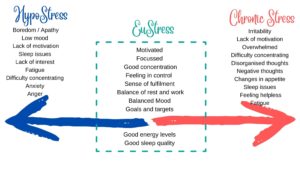8 Ways to Support Your Own Mental Health
When our mental health declines, it can feel overwhelming, scary and quite exhausting. Our instincts can sometimes tell us to hide, act out or to seek out comfort seeking behaviours. However, sometimes, our instincts offer us solutions which increase the struggles that we are experiencing, and as such, we need to consider how else to manage them. This can sometimes feel like a mammoth challenge, but there are some simple steps that we can take which will reduce the stress we are experiencing and offer our brains a little space to navigate the difficulties and accept a little help.

In my therapy work, I frequently talk to the young people that I work with about the stress continuum. The line between boredom and chronic stress, and how we can find the ‘sweet spot’ where we have motivation, consistency of mood and the ability to feel in control. Whilst it takes some navigating, the art of the ‘sweet spot’ is that we learn what our personal warning signs are that things are getting out of control and know the simple steps we can take to:
- Develop a habit of checking in on our commitments regularly
- Monitor our commitments / mood and well-being to identify triggers early and avoid the extremes
- Know the steps we can take to bring them back into line
- Know who to ask for help if things are escalating and we need support

When things become overwhelming, or we feel ourselves slipping towards boredom or chronic stress, there are some simple steps we can implement:
#1 – Implement a routine
Our brains work on a series of patterns. If our brain knows what is coming next it can focus on other things. Having a secure routine of wake up times, sleep times, meals and activities allows us to feel secure. If your day has become chaotic or lost structure, the first step in putting one in place, It does not need to be complicated, but to have some focus, e.g. wake up time, times to be dressed by, meals, exercise etc.
#2 – Review your activity levels
Frequently, when we are feeling overwhelmed or bored our inclination can be to stop and hide on the sofa or in our beds. However, boredom and stress and both linked to cortisol (the stress hormone) which is also tied to anxiety. Implementing daily exercise and movement is therefore highly important to mood. Movement increases serotonin and endorphins which make us feel more motivated and loft our mood naturally. Exercise also gives us opportunity to clear our minds and think of things in different ways. It can range from a walk, a bike ride, running, trampolining, horse riding, gymnastics, racket sports or yoga – the choices are endless.
#3 – Increase your hydration
When we are stressed our body is inflamed. Our body is releasing extra cortisol and this can make our bodies feel exhausted. This places added stress on the body. If we are dehydrated this increases the stress and inflammation in our body. Therefore, ensuring that we are drinking plenty of water each day is incredibly important when we are stressed. Whilst reaching for caffeine, fizzy or energy drinks may feel like they will give you a ‘pick me up’ these further increase stress on the body – the opposite of what we want. Focus on getting your daily water intake met to reduce the strain.
#4 – Reduce refined and processed sugars
Much like dehydration, sugars from sweets, cakes, biscuits and convenience foods also add stress and inflammation to the body. Whilst a little is fine, being aware of the impact of our food choices on our mental health is important. If we are feeling stressed ensuring that we are eating all of our macronutrients is vital. Read more here. A balanced nutritional intake:
- Carbohydrates (for energy- did you know complex carbohydrates support serotonin)
- Protein (for muscle repair and growth)
- Dairy (for bones and teeth)
- Fats (for brain and organ health and function)
- Fruits and vegetables (for nutrients)
- Water (for hydration)
#5 – De-clutter your environment
When we are feeling stressed or bored we can lose motivation and this can mean that our living environment suffers. Clutter can increase feelings of stress, anxiety and depression. Research has found that those who live in cluttered spaces have higher levels of the stress hormone cortisol. Therefore, taking time to declutter and get things in order can increase our mental health and well-being, as well as giving a sense of control and satisfaction.
#6 – Drop the screens
When we spend time on screens it increases the dopamine in our brains. Dopamine is a reward based neurotransmitter, however excess dopamine is linked to stress and mental illness. Further, the lights from screens causes stress to our central nervous system which is linked to stress, anger, irritability and aggression. Therefore, ensuring that we cap our screen time to 2 hours a day is important to managing our well-being and mental health and ensuring that we do not use screens for 90min – 2 hours before bed.
#7 – Stimulation
If our brain is under-stimulated it gets bored and therefore can become destructive. In comparison, having too much stimulation can cause overwhelm. Finding the sweet spot is incredibly important. Paul Mort, inspirational speaker, discusses:
Your brain was created to solve problems – if you do not give it enough problems to solve – it will create some.
Recognising our responsibility to implement routines, hobbies and interests can support our mental health in years to come. Finding interests away from screens is also incredibly important to mental health. Considering; sports, arts and crafts, cooking, construction, reading, games, social opportunities, imaginative play, problem solving……
#8 – Sleep routines
When we are feeling bored or stressed we can often delay getting into bed or stay in bed for longer periods of time. Too much sleep is equally as challenging to the body as not enough sleep, both causing different types of stress. Therefore, we need to ensure:
- Set bedtimes
- A sleep routine at bedtime to prepare the brain for sleep
- Good sleep hygiene (read more here)
- Set wake up times
- Getting up in the morning and making our beds

© Dandelion Training and Development – All Rights Reserved
Further help
 For more articles about mental health visit – ARTICLES
For more articles about mental health visit – ARTICLES
To learn more about child and adolescent mental health visit – COURSES
For resources to support child and adolescent mental health visit –RESOURCES

